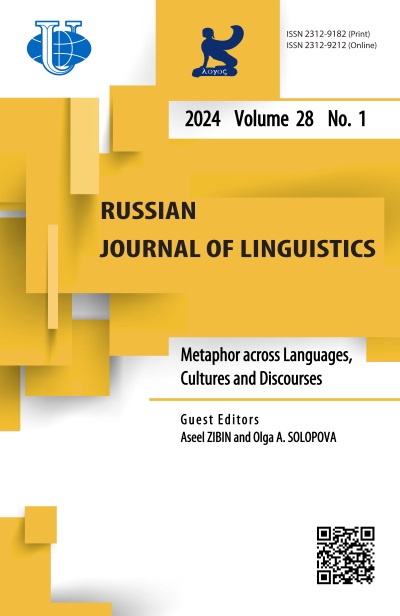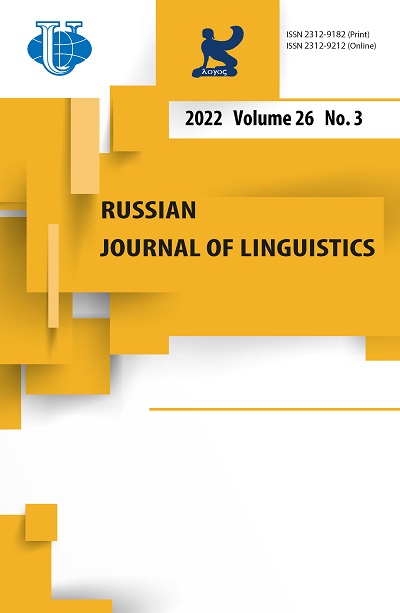Lingua-cultural strata of modern American social media: Precedent phenomena in anti-Trump discourse
- Authors: Konstantinova A.A.1
-
Affiliations:
- Kuban State Technological University
- Issue: Vol 26, No 3 (2022)
- Pages: 744-778
- Section: Articles
- URL: https://journals.rudn.ru/linguistics/article/view/32093
- DOI: https://doi.org/10.22363/2687-0088-27521
Cite item
Full Text
Abstract
Modern media discourse abounds in linguistic units with cultural value including precedent phenomena that fulfil different functions and are employed to achieve particular political goals. Multi-modal (creolized) media texts making use of precedent phenomena as efficient tools of encoding meaning are of special interest. The goal of the study is to identify the role of the precedent phenomena of the English lingua-culture in the production and organization of discourse in the politically engaged network segment of modern American media. The focus is on anti-Trump discourse. The material spans the period from June, 2019 to November, 2020 and comprises 250 sampled examples, mostly multi-modal texts, including Facebook and Twitter posts by anti-Trump communities, political cartoons and memes, and random instances of Internet communication. The research methods applied in this study were critical discourse analysis and multi-modal critical analysis complemented by lingua-cultural method, stylistic analysis, and sampling. The author systematizes the repertoire of the precedent phenomena of the “anti-Trump discourse”, singles out their classes and types, identifies the spheres-sources of the precedent phenomena, and describes their cognitive and discursive functions, as well as the conditions and mechanisms for the actualization of the precedent phenomena in media discourse (thematic repertoire, extralinguistic and linguistic discursive strategies). The study argues that precedent phenomena affect the production and organization of discourse and possess significant potential for influencing mass audiences and molding public opinion. The study concludes that the use of precedent phenomena was an effective vehicle of digital activism and helped to achieve the political goals of American opposition organizations in the 2019-2020 pre-election period.
About the authors
Anna Aleksandrovna Konstantinova
Kuban State Technological University
Author for correspondence.
Email: constanna@mail.ru
ORCID iD: 0000-0002-5647-8236
Doctor Habil., Professor of English at the Department of Foreign Languages №2
Krasnodar, RussiaReferences
- Будаев Э.В. Прецедентные имена в СМИ: методики исследования // Политическая лингвистика. 2021. Т. 3. № 87. С. 22-36. [Budaev, Eduard V. 2021. Precedent names in the media: Research methods. Political Linguistics 3 (87). 22-36. (In Russ.)]. https://doi.org/10.26170/1999-2629_2021_03_02
- Анисимова С.А. Роль прецедентных феноменов в формировании национального ментального пространства (по материалам сопоставительного анализа дискурсов президентов В.В. Путина и Б. Обамы) // Политическая лингвистика. 2016. Т. 3. № 57. С. 77-83. [Anisimova, Sof'ya A. 2016. The role of precedent phenomena in the process of mental space formation (based on the comparative analysis of V.V. Putin and B. Obama discourses). Political Linguistics 3 (57). 77-83. (In Russ.)]
- Вашунина И.В. Креолизация текста как прием реализации манипуляционной стратегии // Преподаватель ХХI век. 2014. № 3. [Vashunina, Irina V. 2014. Text creolization as a technique of realization of manipulative strategy. Prepodavatel XXI Vek 3. https://cyberleninka.ru/article/n/kreolizatsiya-teksta-kak-priem-realizatsii-manipulyatsionnoy-strategii (accessed 04 August 2021)]
- Вашунина И.В., Нистратов А.А. Креолизованный текст: обзор экспериментальных исследований // Вопросы психолингвистики. 2020. Т. 2. № 44. С. 28-39. [Vashunina, Irina V. & Alexandr A. Nistratov. 2020. Creolized text: A review of experimental studies. Voprosy Psikholingvistiki 2 (44). 28-39. (In Russ.)]. https://doi.org/10.30982/2077-5911-2020-44-2-28-39
- Высоцкая И.В. Способы трансформации прецедентных феноменов в современном русском медийном и рекламном тексте // VALODA - 2012. Valoda dažādu kultūru kontekstā. Zinātnisko rakstu krājums XXII. Daugavpils: Daugavpils Universitātes Akadēmiskais apgāds «Saule», 2012. C. 335-341. [Vysotskaya, Irina V. 2012. Sposoby transformatsii pretsedentnykh fenomenov v sovremennom russkom mediinom i reklamnom tekste (The methods of transformation of precedent phenomena in modern Russian media texts and ads). In Language - 2012. Language in Various Cultural Contexts. Collection of scientific articles XXII. Daugavpils: Daugavpils University Academic Press «Saule». 335-341. (In Russ.)]
- Высоцкая И.В. Спорные вопросы теории прецедентности // Критика и семиотика. 2013. Т. 18. № 1. С. 117-137. [Vysotskaya, Irina V. 2013. The controversial questions of the theory of precedent. Critique & Semiotics 18 (1). 117-137. (In Russ.)]
- Гудков Д.Б. Теория и практика межкультурной коммуникации. М.: Гнозис, 2003. [Gudkov, Dmitrii B. 2003. Teoriya i praktika mezhkul’turnoi kommunikatsii (Theory and practice of cross-cultural communication). Moscow: Gnozis. (In Russ.)]
- Караулов Ю.Н. Русский язык и языковая личность. М.: Едиториал УРСС, 2003. [Karaulov, Yurii N. 2003. Russkii yazyk i yazykovaya lichnost’ (The Russian language and the linguistic personality). Moscow: Editorial URSS. (In Russ.)]
- Константинова А.А. Фразеологические слои в постах в социальных сетях о Д. Трампе // Филология в контексте коммуникации и современной культуры: материалы Международного филологического конгресса. Краснодар: Кубанский гос. унт, 2020. Т. 2. С. 117-127. [Konstantinova, Anna A. 2020. Phraseological strata in social media posts about D. Trump. In Filologiya v kontekste kommunikatsii i sovremennoi kul'tury: Materialy mezhdunarodnogo filologicheskogo kongressa (Philology in the context of communication and modern culture: Proceedings of the international philological congress). Krasnodar: Kuban State University Publ. 117-127 (In Russ.)]
- Красных В.В. «Свой» среди «чужих»: миф или реальность? М.: Гнозис, 2003. [Krasnykh, Viktoriya V. 2003. «Svoi» sredi «chuzhikh»: Mif ili real’nost’? (Friend to foes: Myth or reality?). Moscow: Gnozis. (In Russ.)]
- Креолизованный текст: Смысловое восприятие / Отв. ред. И.В. Вашунина. М.: Институт языкознания РАН, 2020. [Vashunina, Irina V. (ed.). 2020. The Creolized Text: Sense Perception. Moscow: Institut yazykoznaniya RAN Publ. (In Russ.)]
- Лотман Ю.М. Семиотика кино и проблемы киноэстетики. Таллин: Ээсти раамат, 1973. [Lotman, Yurii M. 1973. Semiotika kino i problemy kinoehstetiki (Semiotics of cinema and problems of cinema aesthetics). Tallin: Ehehsti raamat. (In Russ.)]
- Мардиева Л.А. Прецедентные визуальные феномены в газетножурнальных текстах // Вестник ТГГПУ. 2007. № 8. [Mardieva, Lyailya A. 2007. Precedent visual phenomena in newspapers and magazines. Tomsk State Pedagogical University Bulletin 8. https://cyberleninka.ru/article/n/pretsedentnye-vizualnye-fenomeny-v-gazetnozhurnalnyh-tekstah (accessed 25 May 2020)]
- Павлина С.Ю. Прагматические и стилистические особенности британских и американских политических карикатур на тему COVID-19. Russian Journal of Linguistics. 2022. Т. 26. № 1. С. 162-193. [Pavlina, Svetlana Y. 2022. Pragmatic and stylistic persperctives on British and American COVID-19 cartoons. Russian Journal of Linguistics 26 (1). 162-193. (In Russ.)]. https://doi.org/10.22363/2687-0088-27107
- Сорокин Ю.А., Тарасов Е.Ф. Креолизованные тексты и их коммуникативная функция // Оптимизация речевого воздействия / под ред. Р.Г. Котова. М.: Наука, 1990. С. 180-186. [Sorokin Yurii A., Tarasov Evgenii F. 1990. Creolized texts and their communicative function. In Renat G. Kotov (ed.), Optimization of verbal impact, 180-186. Moscow: Nauka. (In Russ.)]
- Филон Александрийский. О посольстве к Гаю. Против Флакка. М.: Мосты культуры, 2008. [Philo of Alexandria. 2008. Embassy to Gaius. Moscow: Mosty kul'tury. (In Russ.)]
- Флавий Иосиф. Иудейские древности. Т. 2. М.: Ладомир, 2003. [Flavius, Josephus. 2003. Antiquities of the Jews. Moscow: Ladomir. (In Russ.)]
- Фокина М.А. Прецедентные феномены в интолерантных тактиках российского политического дискурса (на материале блогов политиков) // Политическая лингвистика. 2016. № 6. С. 139-147. [Fokina, Margarita A. 2016. Precedent phenomena in intolerant tactics of Russian political discourse (as exemplified in blogs of politicians). Political Linguistics 6. 139-147. (In Russ.)]
- Чернявская В.Е. Модусы сетевого пространства: вводные замечания // Общество. Коммуникация. Образование. 2020. Т. 11. № 2. С. 7-13. [Chernyavskaya, Valeriya E. 2020. Notes on Digital Communication Modi. Society. Communication. Education 11 (2). 7-13. (In Russ.)]. https://doi.org/10.18721/JHSS.11201
- Fowler, Roger. 1991. Language in the News: Discourse and Ideology in the Press. London; New York: Routledge.
- Fuentes, Marcela A. 2014. Digital activism. Encyclopedia Britannica. URL: https://www.britannica.com (accessed 25 March 2020).
- Graeff, Erhardt. 2016. ‘Youth digital activism.’ World youth report 2015-youth civic engagement. https://www.un.org/development/desa/youth/world-youth-report/2015-2.html (accessed 25 August 2020).
- Konstantinova, Anna. 2019 “Time’s Up” when enough is enough: The proverbial voice of social change. Proverbium 36. 121-134.
- Konstantinova, Anna. 2020. “Love trumps hate”: Proverbial and idiomatic leitmotifs of the anti-Trump social media discourse. Proverbium 37. 143-172.
- Ledin, Per & David Machin. 2018. Multi-modal critical discourse analysis. In John Flowerdew & John E. Richardson (eds.), The Routledge handbook of critical discourse studies, 60-76. London/New York: Routledge
- Paul, Irving H. 1959. Studies in remembering. The reproduction of connected and extended verbal material. Psychological Issues 2 (1). 1-152.
- Poell, Thomas & José van Dijck. 2018. Social media and new protest movements. In Jean Burgess, Alice Marwick & Thomas Poell (eds.), The SAGE handbook of social media, 546-561. London: Sage.
- Ponton, Douglas M. 2021. “Never in my life have I heard such a load of absolute nonsense. Wtf.” Political satire on the handling of the COVID-19 crisis. Russian Journal of Linguistics 25 (3). 767-788. https://doi.org/10.22363/2687-0088-2021-25-3-767-788
- Singh, Spandana & Margerite Blase. 2020. Report. New America. URL: http://www.jstor.org/stable/resrep26363 (accessed 3 February 2021).
- Suciu, Peter. 2020. Forget what the polls say, social media predicts this candidate will be the next president. https://www.forbes.com/sites/petersuciu/2020/10/29/forget-whatthe-polls-say-social-media-predicts-this-candidate-will-be-the-next-president/?sh=53edc329487b/ (accessed 3 February 2021).
- Suciu, Peter. 2021. Social media proved crucial for Joe Biden - It allowed him to connect with young voters and avoid his infamous gaffes. https://www.forbes.com/sites/petersuciu/2020/11/17/social-media-proved-crucial-for-joe-biden--it-allowed-him-to-connect-with-young-voters-and-avoid-his-infamous-gaffes/?sh=7248a5da4148 (accessed 3 February 2021).
- van Dijk, Teun A. & Walter Kintsch. 2014. Cognitive psychology and discourse: Recalling and summarizing stories. In Wolfgang U. Dressler (ed.), Current trends in textlinguistics, 61-80. Berlin, Boston: De Gruyter. https://doi.org/10.1515/9783110853759.61
- Way, Lindon C. 2021. Trump, memes and the Alt-right: Emotive and affective criticism and praise. Russian Journal of Linguistics 25 (3). 789-809 https://doi.org/10.22363/2687-0088-2021-25-3-789-809
- Zappettini, Franco, Douglas M. Ponton & Tatiana Larina. 2021. Emotionalisation of contemporary media discourse: A research agenda. Russian Journal of Linguistics 25 (3). 586-610. https://doi.org/10.22363/2687-0088-2021-25-3-586-610

















